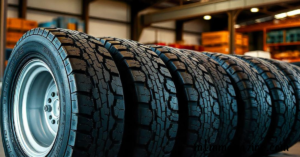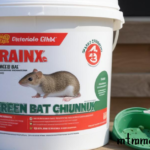Choosing the right tires for your trailer is essential for safe and smooth towing. Welleful tires are popular among trailer owners for their reliability, performance, and durability. In this guide, we’ll break down what to consider when selecting the right Welleful tires for your trailer, covering topics such as size, load capacity, and tread type. By understanding these factors, you can make an informed decision and ensure your trailer is ready for the road.
Why Are Trailer Tires Important?
Trailer tires play a crucial role in the overall safety and stability of your trailer. Unlike regular vehicle tires, trailer tires are specifically designed to carry heavy loads and provide stable towing. The right trailer tires help prevent issues like blowouts, swaying, and uneven wear, which can lead to accidents and costly repairs. For frequent or long-distance towing, investing in high-quality tires like Welleful can make all the difference in your trailer’s performance.
Key Considerations When Choosing Welleful Tires
1. Determine the Right Size
- Check Your Trailer’s Specifications: Before buying tires, check your trailer’s specifications, which are usually listed in the owner’s manual or on a sticker on the trailer itself. This information will include the tire size, load range, and other relevant details.
- Standard Tire Code: Tire sizes are typically displayed as a code on the sidewall, such as “205/75R15.” This code includes the width, aspect ratio, and wheel diameter, all of which are crucial for choosing the right tire. Make sure your new Welleful tires match the recommended size to ensure a good fit.

2. Consider Load Range and Capacity
- Understanding Load Range: Trailer tires come with different load ranges, such as C, D, or E, indicating the tire’s load capacity. The higher the load range, the more weight the tire can support. Make sure the tires you choose match or exceed your trailer’s gross vehicle weight rating (GVWR).
- Calculating Capacity Needs: To determine the right load capacity, divide the total trailer weight by the number of tires. For example, if your trailer weighs 4,000 pounds and has four tires, each tire should support at least 1,000 pounds.
3. Choose the Right Tread Pattern
- Highway Tread: For trailers that primarily travel on highways, highway tread patterns are ideal. These provide a smoother, quieter ride and are designed for towing stability at high speeds.
- All-Terrain Tread: If your trailer frequently travels off-road or on uneven surfaces, consider Welleful tires with all-terrain treads. These treads offer better grip on gravel and dirt, ensuring stability in rough conditions.
4. Understand Ply Rating
- What Is Ply Rating? Ply rating measures the strength of a tire’s construction. Higher ply ratings, such as 8-ply or 10-ply, offer added strength, making them ideal for heavy-duty trailers.
- Match Ply Rating to Usage: For light loads or recreational trailers, a lower ply rating may be sufficient. However, for larger trailers or commercial use, opt for higher ply ratings for durability.
5. Decide Between Bias Ply and Radial Tires
- Bias Ply Tires: Bias ply tires have a stiffer sidewall, which helps stabilize the trailer when carrying heavy loads. They are suitable for shorter trips and trailers that don’t travel at high speeds.
- Radial Tires: Radial tires provide a smoother ride and better fuel efficiency due to their flexible sidewalls. They are ideal for longer distances and higher-speed travel. Welleful offers both types, so choose the one that best suits your towing needs.
Benefits of Choosing Welleful Tires for Your Trailer
Welleful tires are engineered for durability and performance, making them a top choice for trailer owners. They are designed with advanced materials and quality control measures to ensure reliability on the road. Here are some key benefits:
- Extended Tread Life: Welleful tires are made with high-quality rubber compounds that enhance tread life and resist wear, providing long-lasting performance.
- Heat Resistance: These tires are built to withstand high temperatures, reducing the risk of blowouts during long hauls or in hot weather.
- Enhanced Stability: Welleful tires are crafted for stability, with tread designs that reduce sway and ensure a smoother towing experience.

How to Care for Your Welleful Tires
Proper tire maintenance can significantly extend the life of your Welleful tires and ensure safe towing. Here are some simple tips:
- Check Tire Pressure Regularly: Under-inflated or over-inflated tires can lead to uneven wear and increase the risk of blowouts. Check the tire pressure before every trip.
- Rotate Tires Periodically: Rotating tires promotes even wear, which helps extend the lifespan of each tire.
- Inspect for Damage: Regularly inspect your tires for any cuts, bulges, or unusual wear patterns. Replace damaged tires immediately to avoid accidents on the road.
Conclusion
Choosing the right Welleful tires for trailer is key to safe and reliable towing. By considering factors like size, load capacity, tread type, and ply rating, you can find tires that match your trailer’s requirements and your towing needs. Welleful tires offer durability, stability, and long-lasting performance, making them a smart investment for any trailer owner. Remember to maintain your tires regularly to ensure they stay in good condition and provide optimal performance on the road. With the right Welleful tires, you can enjoy smoother, safer travels with your trailer, whether on highways or rugged terrain.
Frequently Asked Questions (FAQs)
1. What is the ideal pressure for Welleful trailer tires?
- The recommended tire pressure varies by model, so check your tire’s sidewall for the maximum pressure rating or consult the trailer’s manual. Typically, trailer tires require higher pressure than regular car tires.
2. How often should I replace my Welleful trailer tires?
- Trailer tires generally last between 3-5 years, but this varies based on mileage and conditions. Inspect them regularly for signs of wear or damage, and consider replacement if tread depth is low.
3. Can I use car tires on my trailer?
- No, trailer tires are specifically designed for towing. They have stiffer sidewalls and different construction to support heavy loads and provide towing stability, which car tires do not offer.
4. Should I choose bias ply or radial Welleful tires?
- Bias ply tires are better for short trips and heavy loads due to their strong sidewalls, while radial tires offer a smoother ride and better fuel efficiency, making them ideal for longer distances.
5. Are Welleful tires suitable for off-road use?
- Yes, Welleful offers all-terrain tires designed for off-road use. These tires have deeper treads for better grip on rough surfaces.



